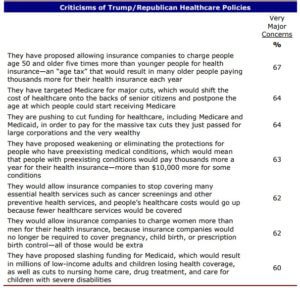TO: Interested parties
FROM: Marjorie Connolly, Communications Director, Protect Our Care
RE: President Trump’s First Year: A War on Women’s Health
DATE: January 19, 2018
A year after the historic Women’s March on Washington, the millions who mobilized against President Trump’s anti-women agenda have seen their worst fears justified. Over the past twelve months, the Trump Administration and its Republican allies in Congress have launched attack after attack on women’s access to health care in parallel with Republicans’ war on American health care.
The Republican war on women’s health care is real and ongoing. Over the past twelve months, the Trump Administration’s actions to undermine Affordable Care Act protections and the Republican Congress’s repeated attempts to roll back women’s right to make their own health care decisions have created a perfect storm of harmful anti-woman policies.
Here’s how Republicans worked to wind back the clock on American women’s health care during Trump’s first year in office:
Defunding Planned Parenthood: Just today, the Trump Administration rolled back Obama-era guidance that warned states not to carve Planned Parenthood out of their Medicaid providers, signaling support for state efforts to place even higher barriers in the way of women’s access to health care. The Republican health repeal bills in Congress also got rid of federal funding for Planned Parenthood.
Taking direct aim at birth control: The Trump Administration’s proposed rule to let any employer opt out of offering health insurance that covers birth control rolls back the Affordable Care Act’s guarantee that women may access copay-free contraception.
Pushing Medicaid cuts that hurt women the most: Women make up almost two-thirds of the Americans projected to lose Medicaid coverage because of the Trump Administration’s push for states to impose work requirements. That’s because women are more likely to hold jobs that do not offer health coverage or to take on primary caregiver duties for other family members.
Stacking federal courts with anti-choice judges: For the next generation, American women will face the threat posed by an increasingly anti-choice federal judiciary. 12 of Trump’s judicial nominees were appointed to circuit courts during his first year – more than any other first-year president in American history.
Reversing progress against breast cancer: Republicans’ repeated attempts to undermine the Affordable Care Act’s essential health benefits threaten landmark progress in women’s preventive health. New research this week finds that the Affordable Care Act requirement that plans (including Medicare) must cover recommended preventive care without a copay led to a significant increase in the number of women receiving mammography screenings.
Allowing insurers to once again charge women more: The Trump Administration’s recent proposed rule expanded Association Health Plans, which would allow plans to skirt some of the Affordable Care Act’s key protections. Under the rule, plans would be able to charge people more based on gender.
Raising costs on women for maternity care: The Republican health repeal bills allowed states to opt of covering “essential health benefits,” such as maternity care, prescription drugs, and substance abuse treatment. As a result, women would have had to purchase that care separately, and therefore pay more. The Congressional Budget Office estimated that maternity care, for example, would cost women $1,000 more per month.



